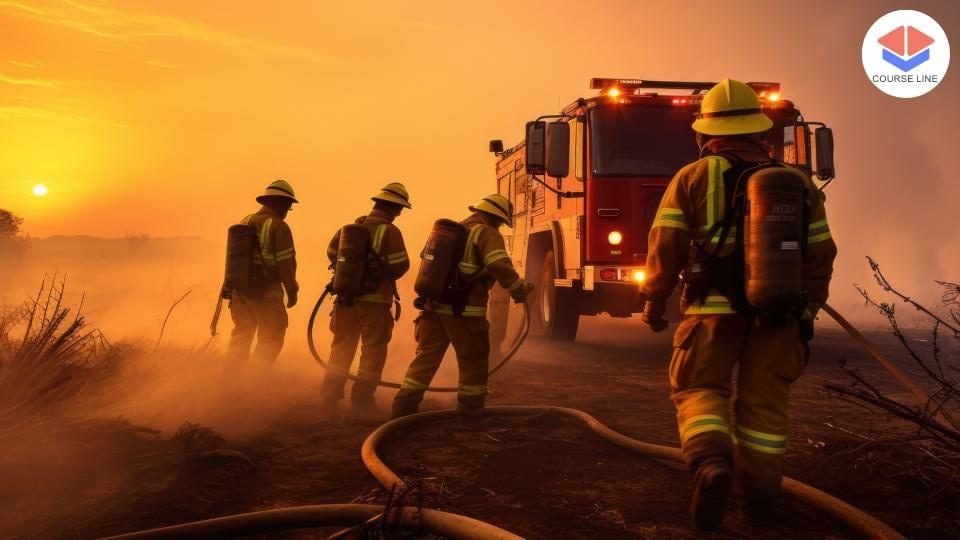Course Features
Price
Study Method
Online | Self-paced
Course Format
Reading Material - PDF, article
Duration
15 minutes
Qualification
No formal qualification
Certificate
At completion
Additional info
Coming soon
- Share
Overview
The Emergency Services: Incident Response & Crisis Management course equips students with the core competencies required for effective emergency response and crisis coordination. It explores the structure and operations of UK emergency services—including police, fire, ambulance, and support agencies—and their critical roles in managing incidents ranging from natural disasters to terror attacks. Learners will gain in-depth knowledge of incident types, crisis phases, and legal responsibilities that underpin emergency response work in the UK.
One of the key components of the course is developing an understanding of multi-agency collaboration and unified command structures such as the Gold, Silver, and Bronze command hierarchy. The curriculum emphasizes the importance of inter-agency communication, public messaging, and leadership during emergencies, alongside real-time decision-making and ethical considerations in high-pressure environments. Students will also examine the application of technologies such as drones, GIS, and communication systems that enhance modern emergency service capabilities.
The course delves into psychological first aid and community recovery, recognising the emotional and mental health impact crises have on both responders and the public. By analysing significant case studies such as the Grenfell Tower fire and Manchester Arena bombing, students learn valuable lessons that continue to shape UK crisis management policies. The final assessment challenges students to apply their knowledge in a simulated multi-agency incident, ensuring they graduate with both theoretical understanding and practical readiness.
Who is this course for?
The Emergency Services: Incident Response & Crisis Management course equips students with the core competencies required for effective emergency response and crisis coordination. It explores the structure and operations of UK emergency services—including police, fire, ambulance, and support agencies—and their critical roles in managing incidents ranging from natural disasters to terror attacks. Learners will gain in-depth knowledge of incident types, crisis phases, and legal responsibilities that underpin emergency response work in the UK.
One of the key components of the course is developing an understanding of multi-agency collaboration and unified command structures such as the Gold, Silver, and Bronze command hierarchy. The curriculum emphasizes the importance of inter-agency communication, public messaging, and leadership during emergencies, alongside real-time decision-making and ethical considerations in high-pressure environments. Students will also examine the application of technologies such as drones, GIS, and communication systems that enhance modern emergency service capabilities.
The course delves into psychological first aid and community recovery, recognising the emotional and mental health impact crises have on both responders and the public. By analysing significant case studies such as the Grenfell Tower fire and Manchester Arena bombing, students learn valuable lessons that continue to shape UK crisis management policies. The final assessment challenges students to apply their knowledge in a simulated multi-agency incident, ensuring they graduate with both theoretical understanding and practical readiness.
Requirements
The Emergency Services: Incident Response & Crisis Management course equips students with the core competencies required for effective emergency response and crisis coordination. It explores the structure and operations of UK emergency services—including police, fire, ambulance, and support agencies—and their critical roles in managing incidents ranging from natural disasters to terror attacks. Learners will gain in-depth knowledge of incident types, crisis phases, and legal responsibilities that underpin emergency response work in the UK.
One of the key components of the course is developing an understanding of multi-agency collaboration and unified command structures such as the Gold, Silver, and Bronze command hierarchy. The curriculum emphasizes the importance of inter-agency communication, public messaging, and leadership during emergencies, alongside real-time decision-making and ethical considerations in high-pressure environments. Students will also examine the application of technologies such as drones, GIS, and communication systems that enhance modern emergency service capabilities.
The course delves into psychological first aid and community recovery, recognising the emotional and mental health impact crises have on both responders and the public. By analysing significant case studies such as the Grenfell Tower fire and Manchester Arena bombing, students learn valuable lessons that continue to shape UK crisis management policies. The final assessment challenges students to apply their knowledge in a simulated multi-agency incident, ensuring they graduate with both theoretical understanding and practical readiness.
Career path
The Emergency Services: Incident Response & Crisis Management course equips students with the core competencies required for effective emergency response and crisis coordination. It explores the structure and operations of UK emergency services—including police, fire, ambulance, and support agencies—and their critical roles in managing incidents ranging from natural disasters to terror attacks. Learners will gain in-depth knowledge of incident types, crisis phases, and legal responsibilities that underpin emergency response work in the UK.
One of the key components of the course is developing an understanding of multi-agency collaboration and unified command structures such as the Gold, Silver, and Bronze command hierarchy. The curriculum emphasizes the importance of inter-agency communication, public messaging, and leadership during emergencies, alongside real-time decision-making and ethical considerations in high-pressure environments. Students will also examine the application of technologies such as drones, GIS, and communication systems that enhance modern emergency service capabilities.
The course delves into psychological first aid and community recovery, recognising the emotional and mental health impact crises have on both responders and the public. By analysing significant case studies such as the Grenfell Tower fire and Manchester Arena bombing, students learn valuable lessons that continue to shape UK crisis management policies. The final assessment challenges students to apply their knowledge in a simulated multi-agency incident, ensuring they graduate with both theoretical understanding and practical readiness.
-
-
- Premium Certificate 00:15:00

No Reviews found for this course.
Is this certificate recognized?
Yes, our premium certificate and transcript are widely recognized and accepted by embassies worldwide, particularly by the UK embassy. This adds credibility to your qualification and enhances its value for professional and academic purposes.
I am a beginner. Is this course suitable for me?
Yes, this course is designed for learners of all levels, including beginners. The content is structured to provide step-by-step guidance, ensuring that even those with no prior experience can follow along and gain valuable knowledge.
I am a professional. Is this course suitable for me?
Yes, professionals will also benefit from this course. It covers advanced concepts, practical applications, and industry insights that can help enhance existing skills and knowledge. Whether you are looking to refine your expertise or expand your qualifications, this course provides valuable learning.
Does this course have an expiry date?
No, you have lifetime access to the course. Once enrolled, you can revisit the materials at any time as long as the course remains available. Additionally, we regularly update our content to ensure it stays relevant and up to date.
How do I claim my free certificate?
I trust you’re in good health. Your free certificate can be located in the Achievement section. The option to purchase a CPD certificate is available but entirely optional, and you may choose to skip it. Please be aware that it’s crucial to click the “Complete” button to ensure the certificate is generated, as this process is entirely automated.
Does this course have assessments and assignments?
Yes, the course includes both assessments and assignments. Your final marks will be determined by a combination of 20% from assignments and 80% from assessments. These evaluations are designed to test your understanding and ensure you have grasped the key concepts effectively.
Is this course accredited?
We are a recognized course provider with CPD, UKRLP, and AOHT membership. The logos of these accreditation bodies will be featured on your premium certificate and transcript, ensuring credibility and professional recognition.
Will I receive a certificate upon completion?
Yes, you will receive a free digital certificate automatically once you complete the course. If you would like a premium CPD-accredited certificate, either in digital or physical format, you can upgrade for a small fee.
Course Features
Price
Study Method
Online | Self-paced
Course Format
Reading Material - PDF, article
Duration
15 minutes
Qualification
No formal qualification
Certificate
At completion
Additional info
Coming soon
- Share
Practice Nurse Level 8 Advanced Diploma
Course Line244£490.00Original price was: £490.00.£14.99Current price is: £14.99.City & Guilds: Bricklaying & Blockwork for Beginners
Course Line238£490.00Original price was: £490.00.£14.99Current price is: £14.99.Level 3 Award in Communication for Player Support Staff
Course Line237£490.00Original price was: £490.00.£14.99Current price is: £14.99.





